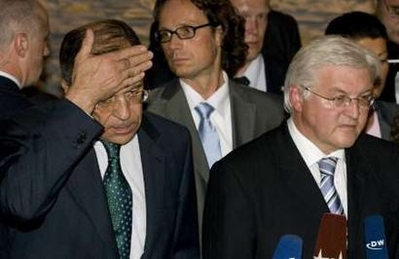
GEORGIA, U.S. ADDRESSING GAPS IN THE GERMAN PLAN ON ABKHAZIA
Publication: Eurasia Daily Monitor Volume: 5 Issue: 141
By:

The Georgian government seeks to fill some of the main gaps in Germany’s plan for political resolution of the Abkhazia conflict. Minister of Foreign Affairs Frank-Walter Steinmeier has in recent days presented the plan to European Union, Georgian, Abkhaz, and Russian leaders, in that sequence (see EDM, July 18, 22, 23).
In a written statement on July 22, the Georgian government welcomes Germany’s active involvement in advancing a negotiating process. However, “the German plan in its present form does not address the proximate cause of the recent, dangerous escalation in the conflict zones: the role and actions of Russia, a central player in degrading security in Georgia.” Those legal, military, and economic violations of sovereignty must be “reversed, as the first stage in any peace process,” the Georgian government says (Civil Georgia, July 23).
Those recent moves include: Russia’s presidential decree on establishing direct official ties with the secessionist authorities; unilateral deployment of additional “peacekeeping” and other forces; seizure of the Georgian state-owned railroad in Abkhazia; military flights in Georgian air space; and the announcement of a Gazprom project in Abkhazia onshore and offshore—all of this in the short interval from April to June.
Apart from those moves cited in the government’s statement, Georgian intelligence has made available to Western authorities in recent days some visual evidence of the militarization of Abkhazia by Russian forces. They are setting up encampments, stockpiling combat materiel, and installing elements of infrastructure at various locations outside the designated “conflict zones,” out of sight of international organizations such as UNOMIG (United Nations Observer Mission in Georgia). Such illegal activities underscore the destabilizing character of Russia’s “peacekeeping” monopoly in Abkhazia.
Steinmeier’s plan focuses on reducing military and political tensions in the first phase, which is by far the most developed of the plan’s three phases. The strong emphasis on de-escalation can even suggest that conflict-prevention, rather than conflict-resolution, is the plan’s real priority. But the plan is bound to fail even in the limited goal of reducing tensions, if it ignores Russia’s recent acts of aggression.
Swedish Minister of Foreign Affairs Carl Bildt has alluded to this weakness of the German plan in a July 22 commentary: Russia’s gradual annexation of Abkhazia, he observes, culminated in the April 16 presidential decree on direct relations with the secessionist authorities, which laid the basis for the current crisis. The “legal” measures toward annexation were followed by the military measures, Bildt observes in his commentary.
U.S. Assistant Secretary of State Daniel Fried implicitly rectifies Berlin’s plan by underscoring that any settlement must be based on Georgia’s territorial integrity within its internationally recognized borders. Steinmeier’s plan notably fails to mention that principle. Fried’s reminder indirectly casts some doubt on Berlin’s assertions that the plan carried the imprimatur of the UN Secretary-General’s Group of Friends on Georgia. Within that group, the United States (among others) upholds Georgia’s integrity and its recognized borders while Russia has stopped paying even lip service to those principles. Given this divergence within the Group of Friends, Berlin apparently decided to cater to Russia’s view on this defining matter.
While the German plan tacitly accepts the continuation of Russian “peacekeeping,” Fried’s statement assures Georgia (and supportive European countries) that proposals to replace Russian “peacekeepers” will have to be considered. And he cites the right of all refugees to return to their homes in Abkhazia as “an essential part” of any political resolution of the conflict (Rustavi-2 TV, July 23; Itar-Tass, July 24).
Georgia and supportive countries believe that the return of refugees and a non-use-of-force commitment, packaged together, belong in the first phase of the peace process, as an indispensable foundation for the subsequent phases of political resolution. Russia and the Abkhaz leaders, however, would indefinitely postpone an organized and safe return of refugees to their homes. The German plan includes both parts of that package in the first phase of the process. But, while the non-use-of-force commitment would be mandatory, the return of refugees would be subject to Russian and/or Abkhaz consent in subsequent negotiations. This would compromise the German plan’s declared goal in the first phase already. Not fully satisfied with this concession, Moscow would postpone the examination of this issue even further.
Russian Minister of Foreign Affairs Sergei Lavrov is now trying to turn the tables on the United States and Georgia by citing the Palestinian refugee issue, implying that Georgian refugees might have to wait as long for returning to Abkhazia. He drew that parallel during Steinmeier’s Moscow visit (Itar-Tass, July 19) and shortly afterward again in a comment aimed at the United States. Pointing to the Palestinian refugees Lavrov sneered, “Anyone asking for a quick solution to that issue?” (Izvestiya, July 23). This tactic is redolent of Moscow’s tactic in the Kosova case, which Russia cited by way of claiming a free hand in post-Soviet conflicts. Such tactics rely on pseudo-analogies between situations inherently different. In Kosova, meanwhile, the political solution involves the reversal of ethnic cleansing, whereas Russia sponsored ethnic cleansing in Abkhazia and opposes the return of refugees.
Lavrov told U.S. Secretary of State Condoleezza Rice on July 23 (meeting on Georgia during the ASEAN Regional Forum in Singapore) that consideration of the refugees’ return to Abkhazia must await later stages of the “peace process.” Meanwhile, Moscow unilaterally sets pre-conditions even to the first stage: a non-use of force agreement (designed to strengthen Moscow’s grip on the situation) and Georgian withdrawal from the upper Kodori Valley (also unacceptable to Georgia and supportive countries) (Itar-Tass, Izvestiya, July 23).
Lavrov and Russian President Dmitry Medvedev had already named these pre-conditions to the visiting Steinmeier in Moscow the preceding week. Moscow is interested in maintaining a certain level of tension in Abkhazia, so as to discourage a possible international peacekeeping presence.




